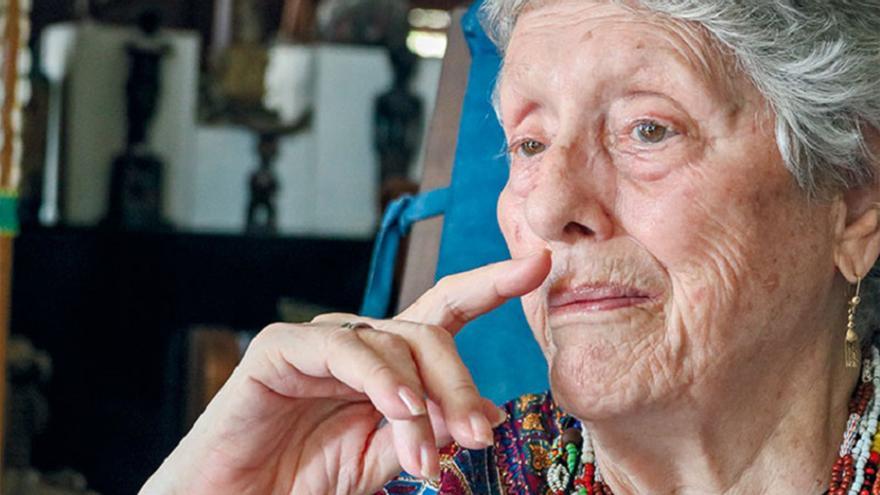
![]() 14ymedio, Havana, 19 November 2023 — Cuban ethnologist, writer and painter Natalia Bolívar Aróstegui died this Sunday in Havana at the age of 89, according to the official press. The cause was not specified. With the death of the expert in Afro-Cuban religions, the Island loses one of the most versatile intellectuals of the twentieth century.
14ymedio, Havana, 19 November 2023 — Cuban ethnologist, writer and painter Natalia Bolívar Aróstegui died this Sunday in Havana at the age of 89, according to the official press. The cause was not specified. With the death of the expert in Afro-Cuban religions, the Island loses one of the most versatile intellectuals of the twentieth century.
Born in the City of Havana on 16 September 1934, in a well-to-do family, she studied ballet as a child and was a swimming champion at the Biltmore Yacht Club. She studied at the American St. George School in the Cuban capital and then enrolled in the Sacred Heart Catholic center, where she graduated with a Bachelor of Science and Letters.
In the early 1950s, Bolívar took numerous courses in Havana and New York in Chinese, Spanish and Cuban art history. She began to feel attracted to anthropology and especially to Afro-Cuban culture, which she glimpsed very early thanks to her nanny, Isabel Cantero.
“She heard the stories of her mother, of Congo origin, and in those stories everything had life, and we went to sleep with those stories,” she recalled in an interview
“She heard the stories of her mother, of Congo origin, and in those stories everything had life, and we went to sleep with those stories,” she recalled in an interview. “I caught the bug of studying Afro-Cuban culture from her.”
Her passion led her to work at the National Museum of Fine Arts, as a guide and interpreter of English and French. Then she went to the Cuban Ethnology room of that institution, where she shared research with Lydia Cabrera. Hand in hand with the author of El Monte and the anthropologist Fernando Ortiz, she trained on topics such as research methodology, ethnography and Afro-Cuban ethnography.
Along with anthropology, Bolívar gained political awareness and at the end of the 1950s joined the Directorio Revolucionario to fight against the dictatorship of Fulgencia Batista. She was part of the organization when several of its members tried to assassinate the dictator in the Presidential Palace, an action that failed.
In July 1958 she was arrested and tortured in the dreaded Bureau of Investigation of Havana. After being released, she took shelter in the Brazilian Embassy but finally left and went underground.
In July 1958 she was arrested and tortured in the dreaded Bureau of Investigation of Havana. After being released, she took shelter in the Brazilian Embassy but finally left and went underground
In January 1959, with the coming to power of Fidel Castro, leader of the Movimiento 26 de julio, the figures linked to the Directorate took a back seat in the power networks. Bolívar was appointed director of what is now called the National Museum of Fine Arts, the Napoleonic Museum, the Decorative Arts and the Numismatic Museum.
From there she developed a frantic career that took her from advising films and plays, to giving lectures, publishing several anthropology books and organizing numerous exhibitions. However, her religiosity led her to experience difficult moments in the decades of greater atheism of Castroism.
Among her books, titles such as The Orishas in Cuba stand out, a volume that suffered censorship for years before reaching bookstores. Her works include Ituto: Death in Afro-Cuban Myths and Rituals; Opolopo Owó: the Divinatory Systems of the Rule of Ocha; Myths and Legends of Afro-Cuban Food and Holy Cuba.
In recent years, her criticism of the administration of the regime also rose in tone, and on several occasions she lamented the authoritarian drift of the Cuban leaders.
Translated by Regina Anavy
____________
COLLABORATE WITH OUR WORK: The 14ymedio team is committed to practicing serious journalism that reflects Cuba’s reality in all its depth. Thank you for joining us on this long journey. We invite you to continue supporting us by becoming a member of 14ymedio now. Together we can continue transforming journalism in Cuba.
